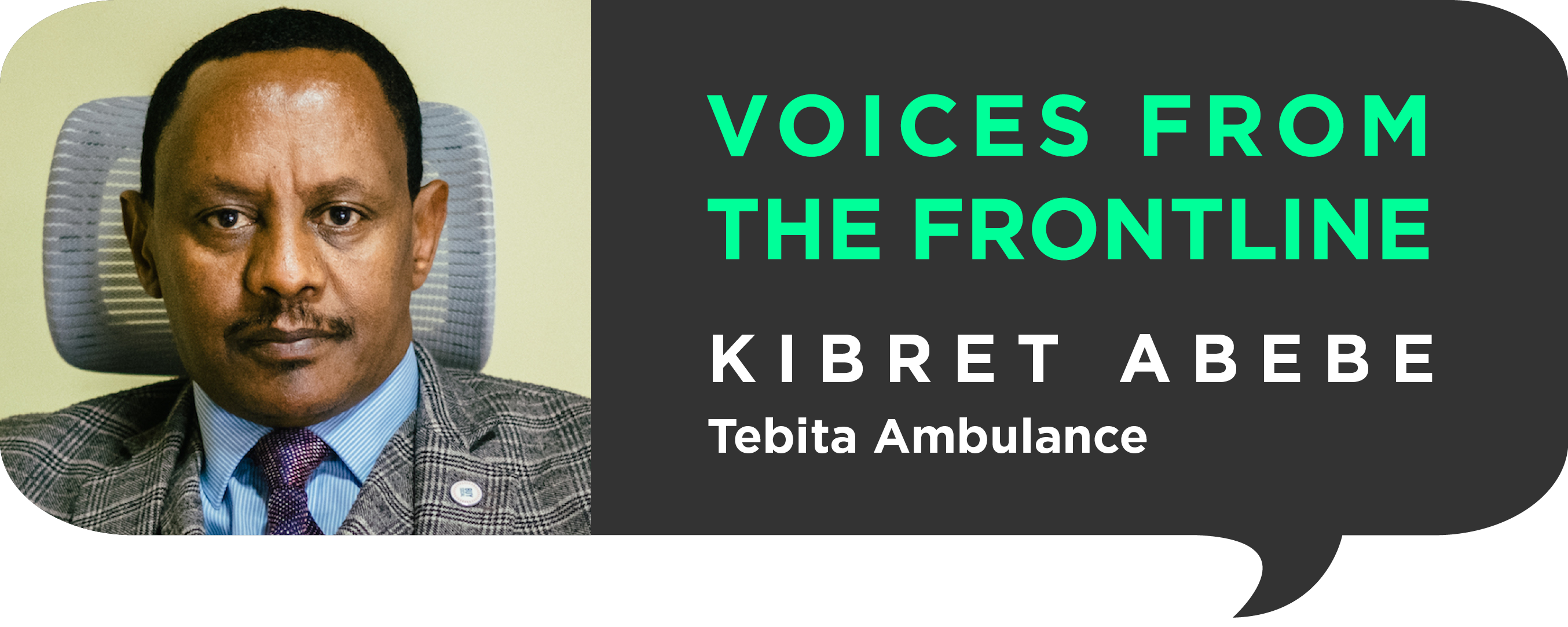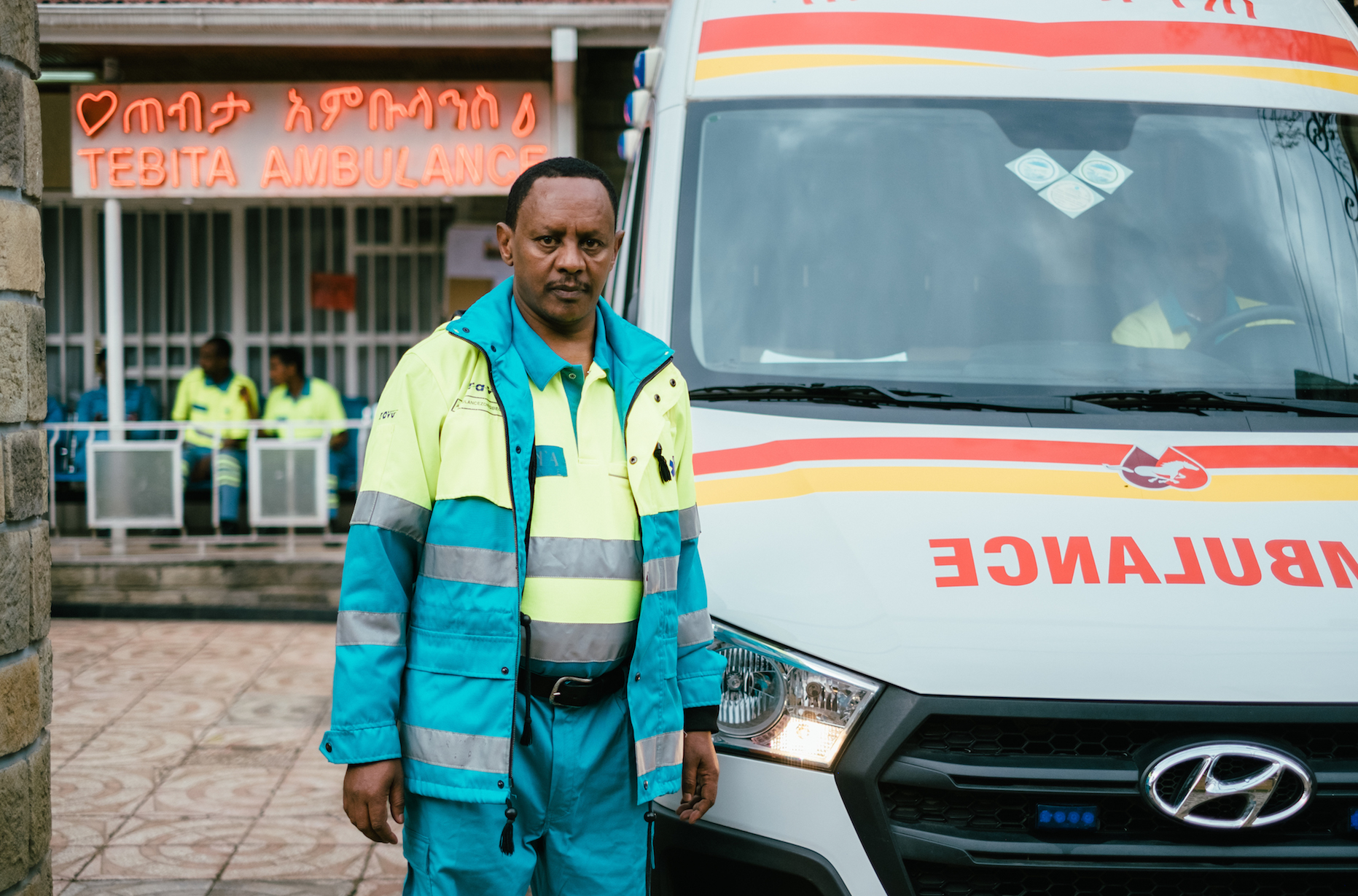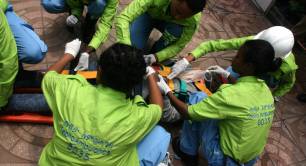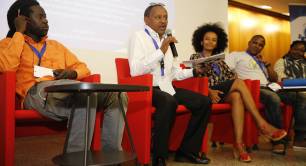‘Covid has made me wonder: am I really an entrepreneur?’ – Kibret Abebe, Tebita Ambulance
Former nurse anaesthetist Kibret Abebe is the founder of Tebita Ambulance, which he set up in 2008 having witnessed many tragic, unnecessary deaths due to Ethiopia’s lack of ambulance services. Starting the business meant ignoring the advice of peers and relatives – who argued that such services were the responsibility of government or the Red Cross – and selling his house to pay for the first three vehicles. Tebita now cross-subsidises its work by providing first aid training and remote medical assistance services to commercial clients; it also runs a paramedic college. But, though Covid-19 has prompted increased need for his company’s expertise, it has also caused huge pressures on the business.

“Even before the first Covid-19 case was confirmed in Ethiopia, we tried to treat every call as if it was a Covid-19 positive case, so that we could protect our employees. We tried to be very vigilant.
There was a shortage of protective equipment – it was not available on the market. We sent a request to the government, but for the first months we didn’t get any. So we tried to innovate – we’re entrepreneurs, we don’t want to wait for anybody! Currently we are making our own masks and protective equipment.
We decided to give our ambulances for free. Otherwise, it would be a loss-loss situation – losing lives while our ambulances were idle
Luckily we had secured a small grant of US$13,000 from a Norwegian NGO, Partnership for Change, to create a mini manufacturing company for first aid bags for cars – Ethiopia is top of the global list for road traffic injuries, with 25.3 fatalities per 100,000 population. While we were preparing the sewing machines for this purpose, the pandemic opened up another opportunity, to make face masks and personal protective equipment.
Safety is still a concern – some people say normal clothes don’t protect you from the virus, and sometimes it’s very difficult to get even gloves, let alone scientifically proven personal protective equipment. The price of disposable gloves is now 400 times higher than in the days before Covid. We asked the government to import gloves, but the bureaucracy is huge: we bought five boxes of gloves from Dubai and had to wait a month to get them from customs.
- Read more social entrepreneur stories in our Voices from the Frontline series
Advanced life support
Before the pandemic, we were responding to 35-40 calls per day, with our 15 ambulances. Then it became, on average, eight to 10 cases per day. Because everybody says that if you go to a health institute, the probability of getting the virus is very high, which is true. They prefer to die at home than going to hospital.
We’re the only company that has ALS [advanced life support] ambulances. Each one cost us 5m Birr [approx. US$140,000] – it has a ventilator, an automatic external defibrillator, trauma bag, cardiac monitor… every gadget that can save those Covid-19 cases in a life-threatening condition.
Above: Kibret Abebe (left) pictured with graduates of Tebita Paramedic College
Immediately after the first case in Ethiopia, on 13 March, the government wrote to us [asking for use of the ALS ambulances]. I said, of course – our motto is impact and we don’t negotiate with saving lives. But we have expenses: we’re paying US$5,000 office rent per month, which is huge money for us, and we have a payroll of US$15,000 per month. So we said: if we work together we need to be paid, otherwise we would collapse within three months. They said it will be very difficult to pay you, because the new public-private partnership (PPP) proclamation [legislation enabling private companies to enter agreements with public bodies] has not yet been validated and we are not able to give contracts to the private sector without an open bid.
My management team decided to give them the ALS ambulances for free. Otherwise, it would be a loss-loss situation – we’d be losing lives, while our ambulances are idle. We don’t want anybody to die under this circumstance. For the last three months, those ambulances have transported a number of patients, staffed by three of our paramedics who recently graduated from Tebita Paramedic College after two years of training. We’re paying their salaries. If we insisted on [asking the government to pay], people would continue to die. And we are happy because we are really making a difference. We are writing our story.
Possible bankruptcy
Covid-19 has opened our eyes. I’ve wondered: am I really an entrepreneur? An entrepreneur should really work on the impact and the profit at the same time. I’m very much an impact-driven person, I don’t care usually about my cash flow.
But without cashflow the company can’t breathe. I’m very conscious of that. As a social enterprise, we didn’t make a lot of profit. Eventually we were using a cross-subsidisation model: our remote ambulance service and our emergency training subsidises our 24/7 ambulance services. What we love most is saving lives, and making the project sustainable. But even for social enterprises, sustainability is not enough. Scalability should be there, diversification of product and services should be there too. If I’d been running an ordinary business, one that makes money, for the last 12 years, I would have been one of the millionaires in Ethiopia. Covid-19 wouldn’t have been a problem.
Without cashflow the company can’t breathe… Even for social enterprises, sustainability is not enough. Scalability should be there, diversification should be there
Our company provides remote medical assistance to multinational companies – they pay us good money. But currently this lucrative revenue stream also faces a problem because almost every foreigner-owned multinational company is closing up and going back home. Luckily one of our clients, Siemens, continues to work in this difficult situation in southern Ethiopia on an electrification project. That’s helped us to pay salaries and cover our costs.
100% optimism
Our top management took a 20% salary decrease – I haven’t received any salary for the last eight months – and of course we’re very much cost-oriented. We’re trying to think innovatively: we’re producing masks and first aid bags to sell, and writing a lot of proposals to provide home-based medical care for non-Covid-19 cases, for example. Rather than talking about the problem, we want to be part of the solution.
But we’re still really, really struggling. I’m not sure we can survive more than three months more. Sometimes we cover our costs, sometimes I need to inject money from my pocket for salaries.

Private banks are not willing to give us a loan. The government gives attention to hotels and tourism by decreasing loan interest rates, from 18% to 5%, but didn’t say anything yet about the medical industry. The government also declared a state of emergency and announced that no private sector company is allowed to downsize during this period. This cannot be a logical solution. If there’s no cash in my company, I will definitely downsize my workforce and then face court.
On the other hand, the government has also taken some positive decisions that will help, like tax reductions. And I’m very optimistic about my prime minister. I always say he’s a typical social entrepreneur – he’s trying to build infrastructure that will generate money in the future. I’d call him a ‘govopreneur’, someone working within the government with the entrepreneurial mindset and very much concerned about sustainability.
Even Covid has a positive side – it forces us to think critically
It’s a really hard time for Ethiopia, for us, for me – but we are very strong, we are 100% sure we will pass through this. Frankly speaking, I’m always optimistic about my country, even though we’re in a very difficult situation – dealing with ethnic conflict, Covid-19, and an election [the general election scheduled for August 2020 has been postponed to 2021 due to the coronavirus] – a lot of issues are there.
Even Covid-19 has its own positive side – it forces us to think critically. If we’re not concerned about those marginalised in our community, then our prosperity, our peace and political stability will not come. Every one of us should be in the same boat. To be a person who says: I already ate, did my brother, did my fellow citizens get what they need? These types of philosophies should come to our mind.”
Kibret was speaking to Anna Patton. Read more about Tebita Ambulance.
All photo credits: Tebita Ambulance




